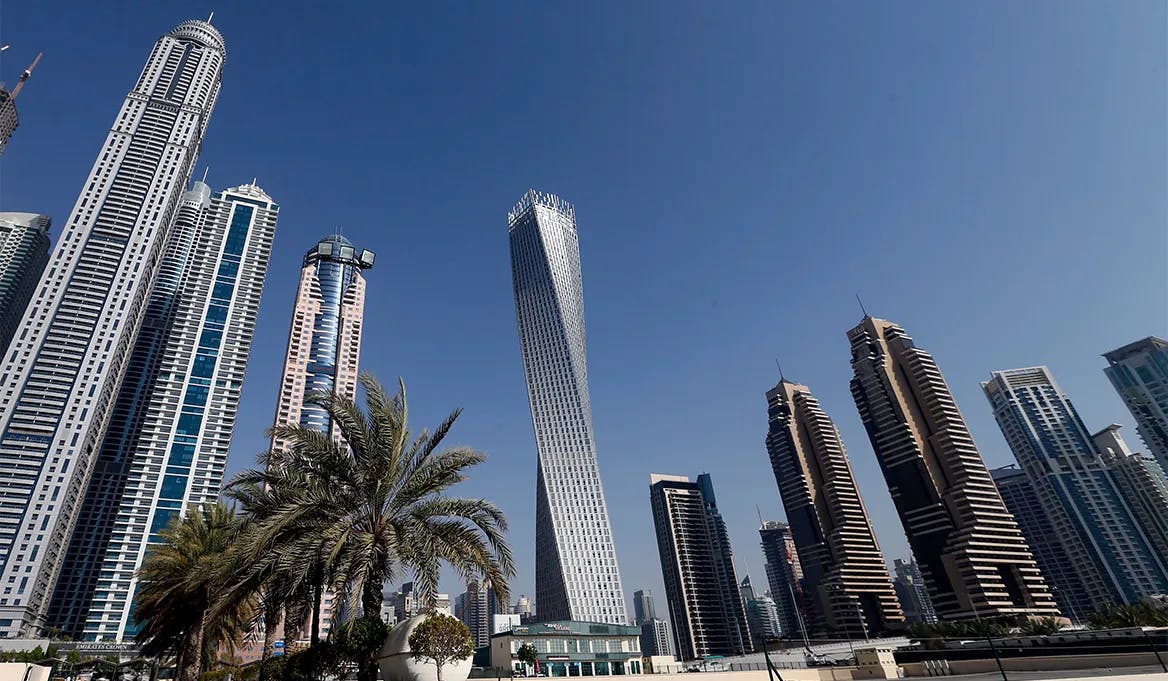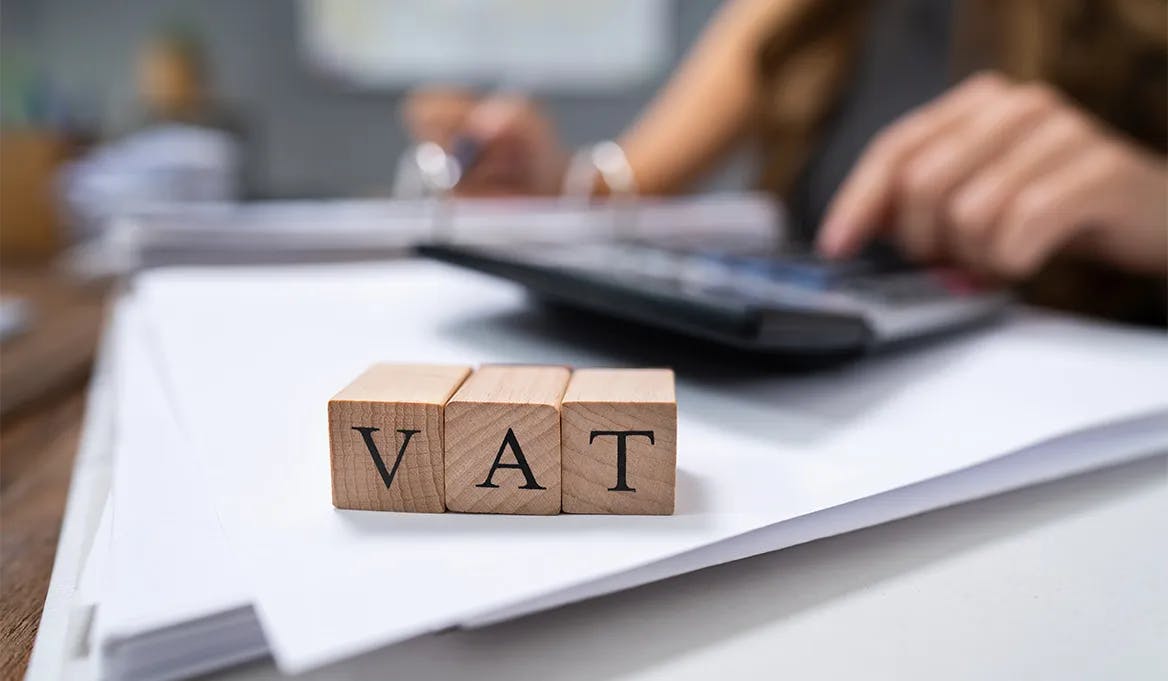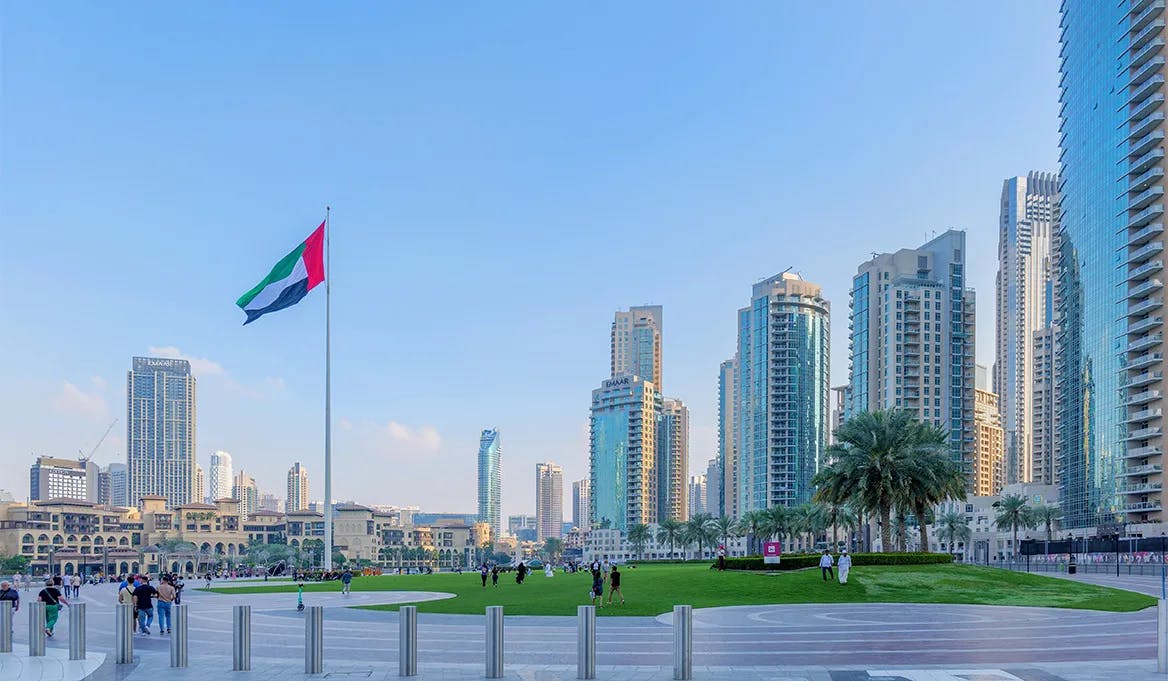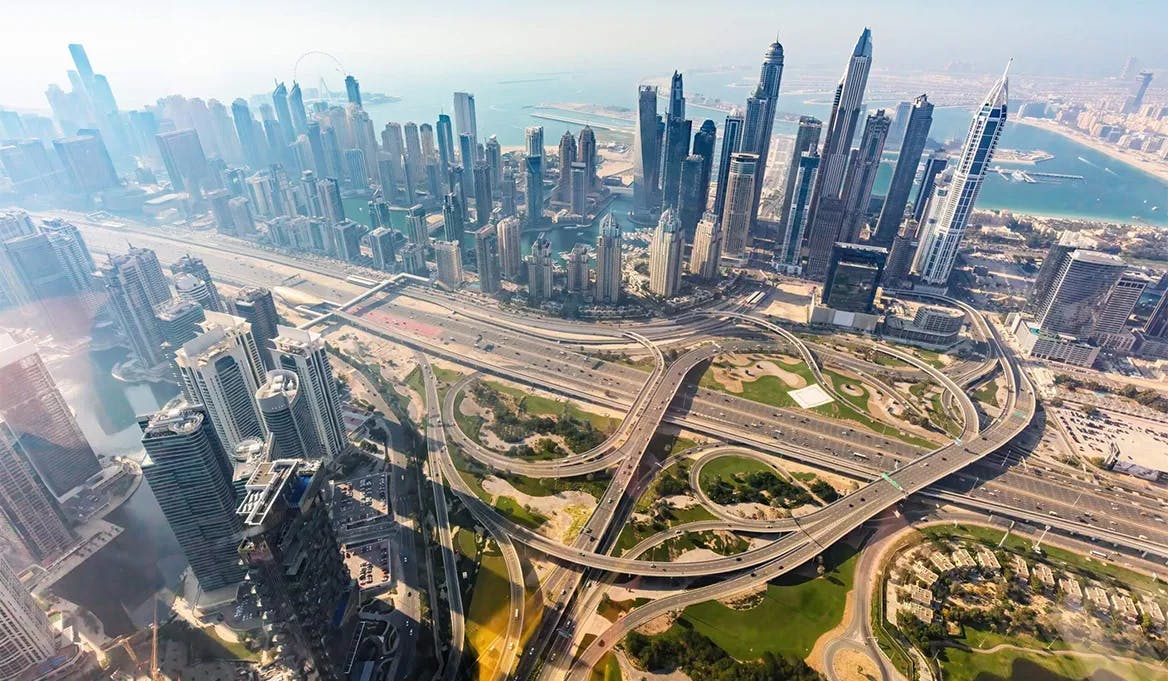
Understanding Property Taxes in Dubai for Foreign Buyers
Nov 7, 2024
4 minutes read
Dubai’s property market offers unique advantages for foreign buyers, making it an attractive investment hub in the global real estate market. While Dubai is well-known for its lack of direct property taxes, foreign buyers still need to navigate specific fees, regulatory requirements, and additional costs associated with real estate transactions. Understanding the property tax landscape in Dubai allows foreign investors to make informed, profitable decisions in one of the world’s most dynamic property markets. Here, we’ll explore everything foreign buyers need to know about Property Taxes in Dubai, covering transactional fees, rental taxes, potential VAT implications, and more.
1. Why Dubai? The Appeal of Tax-Free Property Ownership

Image Credit: CNN
Dubai’s lack of direct property taxes is a major selling point for foreign buyers. In many other countries, investors face ongoing property tax obligations that impact annual returns. However, in Dubai, property ownership comes with limited tax obligations, as there are no ongoing property taxes levied on real estate. This unique setup enhances Dubai’s appeal as a global investment destination, allowing buyers to enjoy high returns without the added burden of annual property tax payments. Foreign investors are therefore encouraged to enter the market, as they can benefit from lower ownership costs and potentially lucrative returns.
Dubai’s tax-free environment is part of its strategy to attract international investors and residents. The government has structured the real estate market to stimulate growth, providing incentives for individuals and companies to purchase and develop property. This structure not only boosts the local economy but also enhances Dubai’s appeal on the international stage as a tax-efficient real estate investment option.
2. Transaction Costs for Foreign Buyers

Although Dubai lacks ongoing property taxes, buyers still incur specific transactional fees when purchasing property. These costs are essential to understand, as they form part of the initial investment outlay. Typically, transactional costs in Dubai include:
- Dubai Land Department (DLD) Registration Fee: The DLD charges a one-time registration fee of 4% of the property’s sale price, payable at the time of purchase. This fee secures the ownership transfer in the official registry, providing legal protection to the buyer.
- Real Estate Agent’s Commission: Real estate agents in Dubai typically charge a commission of 2% of the sale price. This fee is negotiable in some cases, particularly for high-value transactions, and is paid by the buyer as a cost of securing expert assistance throughout the purchase.
- Mortgage Registration Fee: For buyers who finance their purchase with a mortgage, a 0.25% mortgage registration fee applies, calculated on the total loan amount. This fee is payable to the DLD and is mandatory for all mortgage-based transactions in Dubai.
- Property Valuation Fee: For mortgage buyers, a property valuation is required, costing around AED 2,500 to AED 3,500. This valuation ensures that the lender has an accurate assessment of the property’s market value, helping to set the loan amount.
Each of these fees plays a specific role in the property acquisition process and is essential to factor into the budget when buying property in Dubai. For foreign buyers, understanding these transaction costs allows for more accurate financial planning.
3. Property-Related Fees for Non-Residents

Dubai’s tax-free property environment does not exempt buyers from certain ownership-related fees that cover essential services and amenities. These charges ensure that properties remain well-maintained and that developments provide a high-quality living or commercial environment.
- Service Charges: Most properties in Dubai, especially those in gated communities and high-rise buildings, are subject to service charges. These fees cover the cost of maintaining communal areas, such as lobbies, gardens, and security services. Service charges vary depending on the property type and location, and they are calculated on a per-square-foot basis. Understanding the service charges before buying a property is essential, as they can significantly affect long-term ownership costs.
- Maintenance Fees: Although often included in service charges, some properties require separate maintenance fees. These fees cover minor repairs, utility maintenance, and shared building services, ensuring the property remains in optimal condition.
- Homeowners Association (HOA) Fees: In specific residential communities, HOA fees are applied to fund community upkeep and organize events. These fees vary by community but are generally affordable and help maintain a pleasant living environment for residents.
By understanding and accounting for these ongoing fees, foreign buyers can better plan their financial commitments and ensure they are aware of all costs associated with their Dubai property purchase.
4. VAT on Property Transactions: A Key Consideration

In January 2018, Dubai introduced a Value Added Tax (VAT) of 5% on specific goods and services, including certain real estate transactions. Foreign buyers should be aware of VAT’s impact on property purchases, though the tax applies selectively within the real estate sector.
- Residential Property VAT Exemption: Residential property sales and leases are generally exempt from VAT, meaning foreign buyers do not incur VAT charges on their primary residence purchases. This exemption applies to both ready-to-move-in and off-plan residential properties, making Dubai’s residential sector an appealing tax-free investment option for foreign buyers.
- Commercial Property VAT Requirement: VAT applies to commercial property sales and rentals at a standard rate of 5%. This includes office buildings, retail spaces, warehouses, and similar non-residential properties. Buyers interested in Dubai’s commercial property market must consider this VAT charge, as it affects the overall cost of the investment.
- Property Maintenance Services VAT: VAT also applies to maintenance and repair services for both residential and commercial properties. Thus, foreign buyers should expect VAT charges on specific upkeep services, which may slightly increase ongoing maintenance costs.
Understanding the VAT rules ensures that foreign buyers remain aware of any tax implications, particularly if they wish to diversify their investment portfolios by including commercial properties in Dubai.
5. Rental Income Tax Implications for Foreign Buyers

Dubai does not impose an income tax on rental revenue for properties, whether residential or commercial. This policy offers significant advantages for investors, as rental returns remain untaxed. Therefore, foreign buyers interested in buy-to-let properties benefit from Dubai’s tax-free rental income policy, maximizing their investment potential. However, it is essential for foreign investors to understand that their home countries may impose taxes on overseas rental income. Consulting a tax professional familiar with international tax treaties can help investors manage cross-border tax obligations and optimize their global tax situation. The absence of rental income Property Taxes in Dubai makes it an ideal environment for foreign investors seeking high rental yields, especially with the city’s booming rental market and high demand for quality accommodations.
Read More: Short Term Rentals in Dubai
6. Property Transfer Tax: What It Means for Buyers and Sellers

In Dubai, a property transfer tax, often referred to as a transfer fee, is imposed during the resale of properties. This one-time tax, shared between the buyer and the seller, is set at 4% of the property’s sale price.
- Buyer-Seller Agreement on Transfer Fees: While the 4% transfer fee is typically split equally between both parties, the division of payment can be negotiated based on market conditions and buyer-seller agreements. This flexibility allows parties to share costs or shift the fee structure according to their preferences.
- Transfer Fees for Off-Plan Properties: For buyers purchasing off-plan properties, developers often cover transfer fees as part of promotional incentives. This offer can significantly reduce the initial transaction costs for buyers interested in newly built properties.
Understanding how transfer fees work allows foreign buyers to accurately plan their expenses, particularly if they plan to resell the property later. This insight is vital for optimizing long-term investment returns, as transfer fees impact both the buying and selling processes in Dubai’s real estate market.
7. Tax Residency and Double Taxation Considerations

Dubai’s tax-free policies extend benefits to residents and non-residents alike. However, for foreign buyers, it’s essential to consider tax residency rules and the implications of international tax treaties. Depending on a buyer’s home country, any income derived from Dubai properties may be subject to home country tax rules.
- Double Taxation Agreements (DTAs): Dubai has signed numerous DTAs with countries worldwide, preventing double taxation on income earned abroad. For foreign property investors, these agreements provide reassurance that income earned from Dubai property investments will not be taxed twice.
- Tax Residency Status: While Dubai does not have exposure to property taxes in Dubai imposed income tax, some buyers may choose to establish tax residency in Dubai to benefit from the city’s tax-free policies. Dubai’s residency options, such as the Golden Visa program for investors, facilitate long-term residency, which can impact overall tax obligations, particularly for high-net-worth individuals.
By exploring Dubai’s tax residency options and understanding the benefits of DTAs, foreign buyers can potentially minimize their Property Taxes in Dubai exposure and enjoy the full financial advantages of owning property in Dubai.
8. Regulatory Fees and Compliance Requirements

Foreign buyers are required to comply with Dubai’s real estate regulations and pay associated fees. These fees are designed to ensure a secure, transparent property market.
- Oqood Registration for Off-Plan Properties: Buyers of off-plan properties are required to register with the DLD’s Oqood system. This registration safeguards ownership rights and requires a nominal fee, securing the buyer’s stake in the property before completion.
- Ejari Registration for Rental Properties: Investors renting out properties must register tenancy agreements through the Ejari system. This registration legally binds the landlord-tenant agreement and ensures tenant rights. Ejari registration requires a minimal fee and is crucial for any investor entering Dubai’s rental market.
By staying informed about regulatory requirements, foreign buyers ensure a smooth property acquisition process and protect their investments from legal or administrative complications.
9. Financial Planning and Expert Consultation

Purchasing property in Dubai can be complex for foreign buyers unfamiliar with the local market. Consulting with financial advisors, tax specialists, and real estate professionals familiar with Dubai’s regulations can provide invaluable guidance. These experts help investors navigate fees, understand tax implications, and optimize their property portfolios.
10. Maximizing Your Dubai Property Investment

Image Credit: Deposit Photos
Dubai’s favorable tax structure, combined with high rental yields and a robust property market, makes it an attractive option for foreign buyers. By understanding transaction costs, VAT implications, and tax residency benefits, foreign investors can make informed decisions that maximize their property investment’s value. Whether purchasing for personal use or rental income, Dubai’s tax-efficient policies offer a unique investment advantage, solidifying its position as a top destination for international property buyers.
Comprehensive Insights for Foreign Buyers
This guide provides foreign buyers with a comprehensive understanding of property-related taxes and fees in Dubai, along with tips for optimizing their investments. The city’s tax-free property ownership, coupled with a transparent transaction process and regulatory support, creates an ideal environment for investors seeking high returns. By carefully assessing each cost and consulting with professionals where needed, foreign buyers can make sound, informed decisions that enhance the value of their Dubai property investment. With Dubai’s dynamic market and favorable Property Taxes in Dubai policies, buyers have the opportunity to achieve their financial goals while enjoying the benefits of a vibrant, world-class city.
Begin Your Investment Journey with Confidence
Ready to invest in Dubai’s property market? Start your journey with thorough research, expert consultation, and a clear understanding of Dubai’s property tax landscape. Contact us today to ensure a smooth and profitable experience in this exciting global real estate destination.



